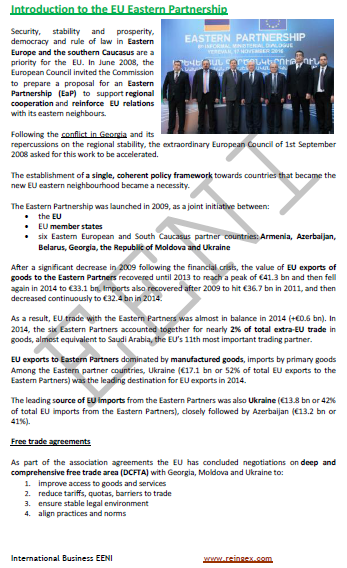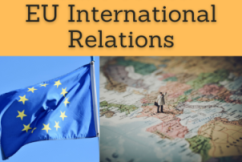European Neighborhood Policy, Armenia
EU Neighborhood Policy, EUROMED, Eastern Partnership. Georgia. Jordan
- Introduction to the European Neighborhood Policy
- EU Eastern Partnership
- Euro-Mediterranean Partnership
- European Neighborhood Policy with Morocco and Tunisia
- The European Union Partnership agreements with Jordan and Egypt
- The European Union relations with Armenia, Azerbaijan, Georgia, and Ukraine
Sample - European Neighborhood Policy (European Foreign Policy):


The educational aims of the Subject “European Neighborhood Policy” are the following:
- To understand the strategic importance of the European Neighborhood Policy
- To analyze the EU Trade Relations with Armenia, Azerbaijan, Jordan, Egypt..

The Subject “European Neighborhood Policy” is included within the curriculum of the following academic programs at EENI Global Business School:
Doctorate: African Business, World Trade.

Masters: International Business, Foreign Trade, Business in Africa.

Courses: International Relations of Africa.

Languages:  or
or  Política de Vecindad UE
Política de Vecindad UE  Politique européenne de voisinage
Politique européenne de voisinage  Política Europeia de Vizinhança.
Política Europeia de Vizinhança.
The objective of the European Neighborhood Policy is averting new dividing lines emergence between the enlarged European Union and neighbors nations and instead strengthening the welfare, stability, and security. The European Neighborhood Policy was founded in 2004.
The European Neighborhood Policy is managed by the European External Action Service (EEAS).
The members of the European Neighborhood Policy are Algeria, Armenia, Azerbaijan, Belarus, Egypt, Georgia, Israel, Jordan, Lebanon, Libya, Moldova, Morocco, Palestine, Syria, Tunisia, and Ukraine.
The European Neighborhood Policy (ENP) is mainly a bilateral policy between the EU and each partner nation, the European Neighborhood Policy is enhanced with cooperation initiatives:
- The Eastern Partnership, the European Commission introduce concrete ideas for improving the relationship with Armenia, Azerbaijan, Belarus, Georgia, Moldova, and Ukraine. The Easter Partnership may involve new Association Agreements (Free Trade Agreements)
- The Union for the Mediterranean: The Euro-Mediterranean Partnership, formerly known as the Barcelona Process, and
- The Black Sea Synergy

The European Neighborhood Policy (ENP) belongs to:
- Afghanistan-Turkey Logistics Corridor
- Europe-Caucasus-Asia Logistics Corridor
- Atlantic Corridor (Portugal-Germany)
- Baltic-Adriatic Corridor (Poland, Slovenia)
- North Sea-Baltic Corridor (Finland, Belgium)
- North Sea-Mediterranean Corridor (Ireland, France)
- International North-South Logistics Corridor
- Trans-Caspian Logistics Corridor
- Pan-European Transport Corridor II (Russia-Germany)
- Pan-European Transport Corridor IX (Finland-Greece)
(c) EENI Global Business School (1995-2025)
Top of this page









 WhatsApp
WhatsApp